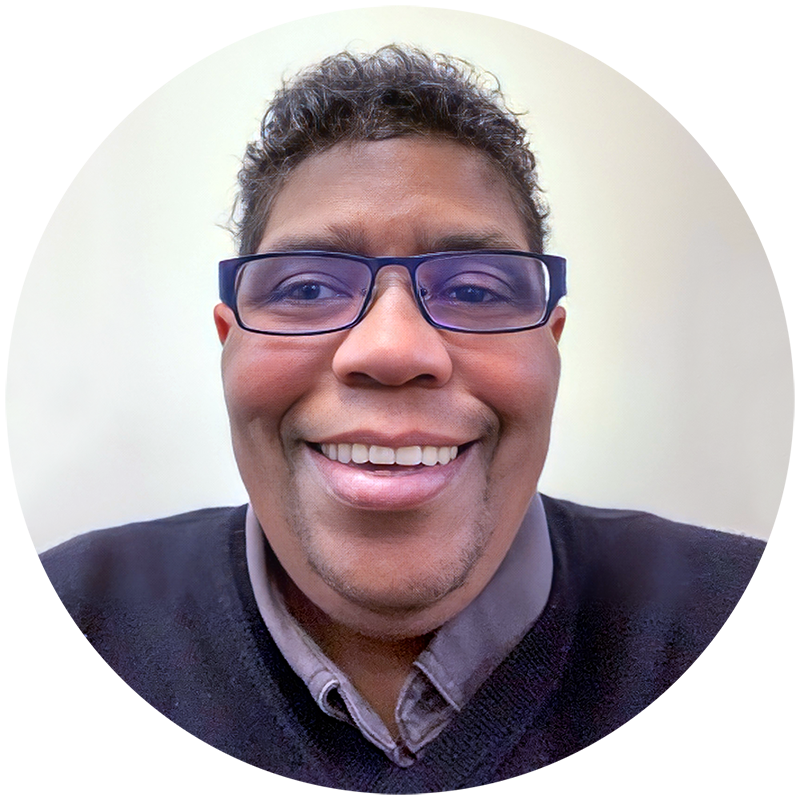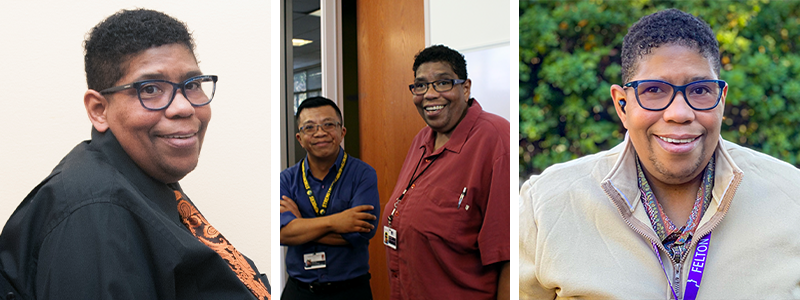Dr. Schon Wade empowers others by being herself. As the Training and Special Projects Coordinator, she brings personal experience and professional expertise to her role, while emphasizing the importance of self-acceptance. “I think empowerment comes from within,” she explains. “It’s the internal strength to do what you want, be what you want and contribute to the world as you are.” For Dr. Wade, this sentiment rings true. Interweaving experiences from her role at Felton Institute as well as her personal life, she shares her insights on agency, self-power, and the importance of supporting one another.

At Felton, Dr. Wade, who holds a doctorate in Education, researches best practices as well as facilitates and coordinates trainings and workshops with mental health professionals. The courses are accredited through CAMFT and BBS and approved by the Association of Social Work Board (ASWB) and the National Board for Certified Counselors (NBCC). Subjects include behavioral health, harm reduction, law and ethics, personality disorders, and mental disorders of youth and adolescents. Dr. Wade stresses the importance of these trainings for mental health providers, “the more prepared our clinicians are, the more effective they will be with their clients.”
In addition to these courses, Dr. Wade is excited about an upcoming training program for clinicians serving LGBTQIA+ communities. Topics will cover best practices in serving transgender clients as well as educating clinicians about the unique differences and obstacles faced by LGBTQIA+. Dr. Wade believes that mental health professionals’ and clinicians’ job is “to be able to give people a sense of their own power and their own self.” For Dr. Wade, her personal journey to self-power and agency began in the home.
“Empowerment is all about your environment and how it helps you,” Dr. Wade states. She credits her family with instilling a sense of agency and confidence in her from a young age. They showed her how to problem solve and look for solutions. Her father, who had suffered from a childhood injury to his foot that inhibited his ability to walk, created a shoe which allowed him to become mobile again. Dr. Wade remembers fondly that her father would tell her “‘there’s always a way around an obstacle.’ And I guess that’s where I get that from,” she says. “He always said to us ‘if you run into a wall, there’s always a way to get around it.'”
Born and raised in Minneapolis, Minnesota, Dr. Wade grew up with three brothers. She was the first girl born in six generations on her father’s side. Her parents “were happy and thrilled about that. Mom was waiting for the white wedding dress and tons of kids.” But, Dr. Wade laughs, “my mom found out pretty quick that wasn’t going to happen.” She explains, “I’ve been gay all of my life and luckily my parents were cool about it.” Her supportive parents coupled with self-acceptance, would provide Dr. Wade with the confidence and agency to reject racist attitudes.
Dr. Wade, who identifies as Black, lived in a predominantly White region of the country. While she had White and Black friends, she encountered racial prejudice growing up. Dr. Wade reflects on the racism she experienced, stating, “My being Black is not my problem, but it’s your problem because I can’t change that. And if you have a problem with it, you have to change your attitude.”
Dr. Wade’s life is a tapestry of lived experiences which provide a unique perspective on societal issues. As Felton Institute celebrates and commemorates two major holidays this month, Pride and Juneteenth, Dr. Wade offers her reflections on topics that have affected her personally.
During Pride month, we celebrate the dignity, rights, and history of LGBTQIA+. Dr. Wade emphasizes the importance of visibility and self-acceptance. “Gay folks got to go out and strut their stuff and show the world that we are in your world,” she says. Additionally, having adopted children with her wife of 34 years, she recognizes the importance of supporting youth, “I support the LGBT kids and the struggles they go through. For them to be able to say, ‘I’m gay,’ or ‘I’m trans,’ it’s okay – you are different just as everyone is different.” She continues, “Everyone is special, and you have to believe being special is okay.” In addition to Pride, Dr. Wade shares her thoughts on a holiday honoring the struggles and triumphs of Black people.
Juneteenth, a day commemorating the emancipation of enslaved African Americans, was declared a federal holiday in 2021. Dr. Wade highlights the endurance and self-power of those who came before, “Black people had an influence in this nation, and you need to recognize that.” Furthermore, she adds, “it shows the ingenuity and perseverance of Black folks back then. Every living African American knows that somebody back then fought a hard fight to survive and thrive for us to be here now.”
Dr. Wade brings her personal experiences and insights to empower others at Felton Institute. She recognizes the value of a supportive and collaborative environment to overcome any obstacles, important lessons she learned from her family and lived experiences. “We all can’t do it alone,” she says, adding, “the people around you give you the power to believe that you can do this. And I think that’s what clinicians do and Felton in particular.”

If you’d like to learn more about Felton Institute’s Behavioral Health Training Series, you can visit our LMS website.
Our “Working with LGBTQ Clients: Gender Identity & Sexual Orientation Issues in Mental Health” training program will be offered virtually on zoom on 11/18/2022 from 09 AM – 5 PM.
About Felton Institute: Founded in 1889, Felton Institute responds to human needs by providing cutting edge, evidence-based mental health and social services that transform lives. Felton Institute is a tax-exempt organization registered 501(c)(3) nonprofit under EIN 94-1156530.
Offering more than 50 acclaimed and honored programs that address homelessness, mental health, prenatal, adolescent, adult, and senior needs, Felton Institute provides services in San Francisco, Alameda, San Mateo, Marin, and Monterey counties. Felton’s social services and programs utilize the latest scientific research, combining cultural sensitivity, deep respect for client and staff, and a commitment to social justice.
Felton is the oldest non-sectarian and nonprofit social services provider in the City and County of San Francisco. For over a century, Felton Institute has been at the forefront of social service innovation, pioneering new approaches to meet underserved populations’ emerging needs. At the heart of our work is the belief that individuals and families in crisis must have access to services and resources to help them build on their inherent strengths and develop self-sufficiency. www.felton.org